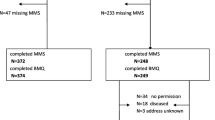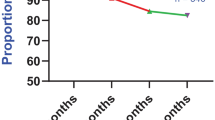Abstract
Objective
Non-adherence to medication is an important problem in cardiovascular treatment. The aim of this study was to assess self-reported non-adherence in Japanese patients with cardiovascular disease.
Methods
A total of 1372 outpatients at three university hospitals who completed self-reported questionnaires were analyzed in this prospective study (mean age 67 ± 12 years; 31% female). Self-reported adherence to cardiovascular drugs was measured with a modified Siegal scale. Depressive symptoms were defined as a Patient Health Questionnaire-9 score of ≥ 10.
Results
A total of 227 patients (17%) were defined as non-adherent. Multiple logistic regression analysis showed that ≥ 2 times daily dosing frequency, age < 65 years and active employment were significantly associated with non-adherence, with odds ratios of 4.42 [95% confidence interval (CI) 3.02–6.48], 1.70 (95% CI 1.23–2.35) and 1.43 (95% CI 1.03–1.99), respectively. However, depression was not a significant factor in non-adherence.
Conclusions
Our study showed that self-reported non-adherence to medications was 17% in Japanese patients with cardiovascular disease in the university hospital setting. Daily dosing frequency, younger age and employment were significantly associated with non-adherence.
Trial Registration
University hospital Medical Information Network Clinical Trials Registry (UMIN-CTR) no. UMIN 000023514.
Similar content being viewed by others
References
Gourzoulidis G, Kourlaba G, Stafylas P, Giamouzis G, Parissis J, Maniadakis N. Association between copayment, medication adherence and outcomes in the management of patients with diabetes and heart failure. Health Policy. 2017;121:363–77.
Kolandaivelu K, Leiden BB, O’Gara PT, Bhatt DL. Non-adherence to cardiovascular medications. Eur Heart J. 2014;35:3267–76.
Banerjee A, Khandelwal S, Nambiar L, Saxena M, Peck V, Moniruzzaman M, Faria Neto JR, Quinto KC, Smyth A, Leong D, Werba JP. Health system barriers and facilitators to medication adherence for the secondary prevention of cardiovascular disease: a systematic review. Open Heart. 2016;14(3):e000438.
Kronish IM, Ye S. Adherence to cardiovascular medications: lessons learned and future directions. Prog Cardiovasc Dis. 2013;55:590–600.
Bansilal S, Castellano JM, Garrido E, Wei HG, Freeman A, Spettell C, Garcia-Alonso F, Lizano I, Arnold RJ, Rajda J, Steinberg G, Fuster V. Assessing the impact of medication adherence on long term cardiovascular outcomes. J Am Coll Cardiol. 2016;68:789–801.
Naderi SH, Bestwick JP, Wald DS. Adherence to drugs that prevent cardiovascular disease: meta-analysis on 376,162 patients. Am J Med. 2012;125:882–7.e1.
Fitzgerald AA, Powers JD, Ho PM, Maddox TM, Peterson PN, Allen LA, Masoudi FA, Magid DJ, Havranek EP. Impact of medication nonadherence on hospitalizations and mortality in heart failure. J Card Fail. 2011;17:664–9.
Yao X, Abraham NS, Alexander GC, Crown W, Montori VM, Sangaralingham LR, Gersh BJ, Shah ND, Noseworthy PA. Effect of adherence to oral anticoagulants on risk of stroke and major bleeding among patients with atrial fibrillation. J Am Heart Assoc. 2016;5:e003074.
Xu T, Yu X, Ou S, Liu X, Yuan J, Tan X, Chen Y. Adherence to antihypertensive medications and stroke risk: a dose-response meta-analysis. J Am Heart Assoc. 2017;6:e006371.
Ferdinand KC, Senatore FF, Clayton-Jeter H, Cryer DR, Lewin JC, Nasser SA, Fiuzat M, Califf RM. Improving medication adherence in cardiometabolic disease: practical and regulatory implications. J Am Coll Cardiol. 2017;69:437–51.
Rodriguez F, Cannon CP, Steg PG, Kumbhani DJ, Goto S, Smith SC, Eagle KA, Ohman EM, Umez-Eronini AA, Hoffman E, Bhatt DL. REACH Registry Investigators. Predictors of long-term adherence to evidence-based cardiovascular disease medications in outpatients with stable atherothrombotic disease: findings from the REACH Registry. Clin Cardiol. 2013;36:721–7.
Suzuki T, Shiga T, Omori H, Tatsumi F, Nishimura K, Hagiwara N. Depression and outcomes in Japanese outpatients with cardiovascular disease: a prospective observational study. Circ J. 2016;80:2482–8.
Gehi AK, Ali S, Na B, Whooley MA. Self-reported medication adherence and cardiovascular events in patients with stable coronary heart disease: the heart and soul study. Arch Intern Med. 2007;167:1798–803.
Patel MR, Hellkamp AS, Lokhnygina Y, Piccini JP, Zhang Z, Mohanty S, Singer DE, Hacke W, Breithardt G, Halperin JL, Hankey GJ, Becker RC, Nessel CC, Berkowitz SD, Califf RM, Fox KA, Mahaffey KW. Outcomes of discontinuing rivaroxaban compared with warfarin in patients with nonvalvular atrial fibrillation: analysis from the ROCKET AF trial (Rivaroxaban Once-Daily, Oral, Direct Factor Xa Inhibition Compared With Vitamin K Antagonism for Prevention of Stroke and Embolism Trial in Atrial Fibrillation). J Am Coll Cardiol. 2013;61:651–8.
Wu JR, Moser DK, Lennie TA, Burkhart PV. Medication adherence in patients who have heart failure: a review of the literature. Nurs Clin North Am. 2008;43:133–53.
Siegal BR. Postrenal transplant compliance: report of 519 responses to a self-report questionnaire. Transplant Proc. 1993;25:2502.
Schäfer-Keller P, Steiger J, Bock A, Denhaerynck K, De Geest S. Diagnostic accuracy of measurement methods to assess non-adherence to immunosuppressive drugs in kidney transplant recipients. Am J Transplant. 2008;8:616–26.
Morisky DE, Green LW, Levine DM. Concurrent and predictive validity of a self-reported measure of medication adherence. Med Care. 1986;24:67–74.
Lichtman JH, Bigger JT Jr, Blumenthal JA, Frasure-Smith N, Kaufmann PG, Lesperance F, Mark DB, Sheps DS, Taylor CB, Froelicher ES, American Heart Association Prevention Committee of the Council on Cardiovascular Nursing; American Heart Association Council on Clinical Cardiology, American Heart Association Council on Epidemiology and Prevention, American Heart Association Interdisciplinary Council on Quality of Care and Outcomes Research, American Psychiatric Association. Depression and coronary heart disease: recommendations for screening, referral, and treatment: a science advisory from the American Heart Association Prevention Committee of the Council on Cardiovascular Nursing, Council on Clinical Cardiology, Council on Epidemiology and Prevention, and Interdisciplinary Council on Quality of Care and Outcomes Research: endorsed by the American Psychiatric Association. Circulation. 2008;118:1768–75.
Ho PM, Bryson CL, Rumsfeld JS. Medication adherence: its importance in cardiovascular outcomes. Circulation. 2009;119:3028–35.
Haynes RB, Gibson ES, Hackett BC, Sackett DL, Taylor DW, Roberts RS, Johnson AL. Improvement of medication compliance in uncontrolled hypertension. Lancet. 1976;307:1265–8.
Kimmel SE, Chen Z, Price M, Parker CS, Metlay JP, Christie JD, Brensinger CM, Newcomb CW, Samaha FF, Gross R. The influence of patient adherence on anticoagulation control with warfarin: results from the International Normalized Ratio Adherence and Genetics (IN-RANGE) Study. Arch Intern Med. 2007;167:229–35.
Shiba N, Nochioka K, Miura M, Kohno H. Shimokawa H; CHART-2 Investigators. Trend of westernization of etiology and clinical characteristics of heart failure patients in Japan–first report from the CHART-2 study. Circ J. 2011;75:823–33.
Kneeland PP, Fang MC. Current issues in patient adherence and persistence: focus on anticoagulants for the treatment and prevention of thromboembolism. Patient Prefer Adherence. 2010;4:51–60.
Coleman CI, Roberts MS, Sobieraj DM, Lee S, Alam T, Kaur R. Effect of dosing frequency on chronic cardiovascular disease medication adherence. Curr Med Res Opin. 2012;28:669–80.
Rodriguez RA, Carrier M, Wells PS. Non-adherence to new oral anticoagulants: a reason for concern during long-term anticoagulation? J Thromb Haemost. 2013;11:390–4.
Claxton AJ, Cramer J, Pierce C. A systematic review of the associations between dose regimens and medication compliance. Clin Ther. 2001;23:1296–310.
DiMatteo MR, Lepper HS, Croghan TW. Depression is a risk factor for noncompliance with medical treatment: meta-analysis of the effects of anxiety and depression on patient adherence. Arch Intern Med. 2000;160:2101–7.
Berntson J, Stewart KR, Vrany E, Khambaty T, Stewart JC. Depressive symptoms and self-reported adherence to medical recommendations to prevent cardio- vascular disease: NHANES 2005-2010. Soc Sci Med. 2015;138:74–81.
Goldstein CM, Gathright EC, Garcia S. Relationship between depression and medication adherence in cardiovascular disease: the perfect challenge for the integrated care team. Patient Prefer Adherence. 2017;11:547.
Acknowledgements
We thank Professor Hiroshi Kasanuki, Dr. Hiroto Ito and the Japanese Society of Psychosomatic Cardiology for their support and the research coordinators at Asmo Clinical Pharmacology Laboratories, Ltd., for their assistance.
Author information
Authors and Affiliations
Corresponding author
Ethics declarations
Funding
This study was supported by the Health and Labour Sciences Research Grant (H24-Seishin-Ippan-001).
Conflict of interest
Dr. Shiga has received lecture fees from Toa Eiyo and Daiichi-Sankyo. Dr. Hagiwara has received research funding from Eisai, Nippon Boehringer Ingelheim and Daiichi-Sankyo and has received lecture fees from Nippon Boehringer Ingelheim and Bristol-Myers Squibb. The other authors, T. Suzuki, H. Omori, F. Tatsumi, and K. Nishimura, have nothing to disclose.
Rights and permissions
About this article
Cite this article
Suzuki, T., Shiga, T., Omori, H. et al. Self-Reported Non-adherence to Medication in Japanese Patients with Cardiovascular Diseases. Am J Cardiovasc Drugs 18, 311–316 (2018). https://doi.org/10.1007/s40256-018-0278-z
Published:
Issue Date:
DOI: https://doi.org/10.1007/s40256-018-0278-z




